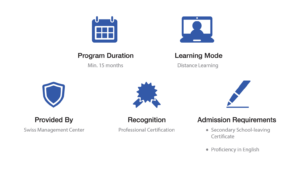The BBA will expand and deepen your understanding and mastery of the most relevant business disciplines. The program is strongly oriented towards real-world application, rather than theory – a highly topical blend of academic content adapted for the experienced working professional. Graduates of this program may advance into SMC’s online MBA program. The online program is intellectually rewarding and has been designed by top academicians and business leaders. It strongly supports self-paced learning and provides unparalleled flexibility. It forms a cornerstone of the program’s performance management and trains your feedback-, responsibility-, timing-, and teamwork skills.

This course covers the marketing process and examines the range of marketing decisions that an organization must make to sell its products and services. The student will be introduced to a marketing mindset, discovering the consumer focus of marketing. The course will familiarize the learner with the art and science of marketing a product.
The course provides an in-depth introduction to the study of the accounting for business entities such as sole proprietorships, partnerships, and corporations. It examines the process of recording and analyzing transactions, the process of the accounting cycle, including record-keeping, preparation of financial statements, and the theory of accounts.
This course explores the basic concepts of managing, planning, and controlling an organization. It begins with the process of building leadership skills and lays a solid base for the difficult tasks of human resources management. The course focuses on communication, decision making and leadership for administrative and managerial positions in business and government.
This course provides students with the required skills to produce clear written communication which is concise and persuasive, and which helps enhance the competitive advantage of the company. Topics include reports, proposals, tenders and letters, commercial correspondence, and effective reports. Furthermore, the course examines the seven aspects of a dynamic presentation, shows methods of structuring, visualizing, and delivering the message.
This course focuses on how firms formulate, implement, and evaluate strategies in a turbulent and rapidly changing environment. Students will focus on integrated decision making in terms of strategy formation, implementation, and evaluation.
Entrepreneurship is the process of seizing or creating opportunity without regard to the resources controlled. This course is innovative in its curriculum, as it deals with theory and practice of managing and owning your business and how new businesses are started. It shows methods of recognizing opportunities, exploiting them, and obtaining the desired business results. The course also deals with the problems of running a family business, working with family members, and building larger organizations. It teaches the students the steps in creating a good business plan.
Introductory course to the laws and ethical standards that managers must abide by while conducting business. Explores the legal framework designed to protect both consumers and businesses and outlines the legal and ethical environment in which businesses operate. Students will also explore the relationship between legal and ethical standards to critically analyze and evaluate the behavior of business owners, managers, and employees.
This course will convey essential economic concepts and analytical tools. The course covers the definition of an ideal economic outcome, how markets work to achieve this outcome under ideal conditions, and what happens when conditions deteriorate. The course also covers the role of government in creating the proper environment for private markets to work well, and how government can improve outcomes under adverse conditions. Major topics include consumer choice, production decisions, market structures, fiscal and monetary policies, unemployment, inflation, international trade, and exchange rates.
The course is an introduction to the complex issues of human resources management and human relations in general. It examines and provides a solid ground for understanding human behavior, human resources and their development and the issues and challenges that impact companies and organizations.
The global environment of today and the increased cultural diversity in business require culturally-aware managers in both domestic and international markets. This course focuses on cultural and cross-cultural management and communication and builds an understanding of the impact of cultural diversity on business practices.
This course explores into depth the issues and concepts of a successful financial management of a firm. Topics include capital budgeting, NPV, IRR, Profitability Index, Net Working Capital management in cash management, credit policies, receivables management, inventory.
The course will provide the student with an analytical framework for the study of international trade. Keeping up with the international environment has become a central concern in business strategy and national economic policy. The course will cover a broad array of relevant topics, exploring both theoretical models and empirical studies to determine a model that best fits real world” data. This course will frequently compare competing theories concerning the nature of international trade and the gains or losses thereof. The student will work to understand the economic intuition behind technically demanding models and define the assumptions behind various theories before evaluating how well those models fit actual trading economies. The learner will also explore the relevance and policy implications of various theories/models, especially in terms of growth, income distribution, and development.
The increased competition and the challenges of the global economy result in many companies today profiling themselves and therefore outsourcing parts of their R&D, production, and delivery processes to specialized, external suppliers. The result of this phenomenon is the increasing need of managing suppliers and the underlying purchasing and negotiation processes, which have become crucial to the financial success of the firm, both in relation to costs, but also to quality and innovation.
Examines the sales management process of the company, as well as the different methods of sales that can be applied in business. The course will review planning, staffing, training, directing, and controlling the sales team, and will develop the skills of the you in sales.
To learn more about qLearn click on the FAQ download button below.